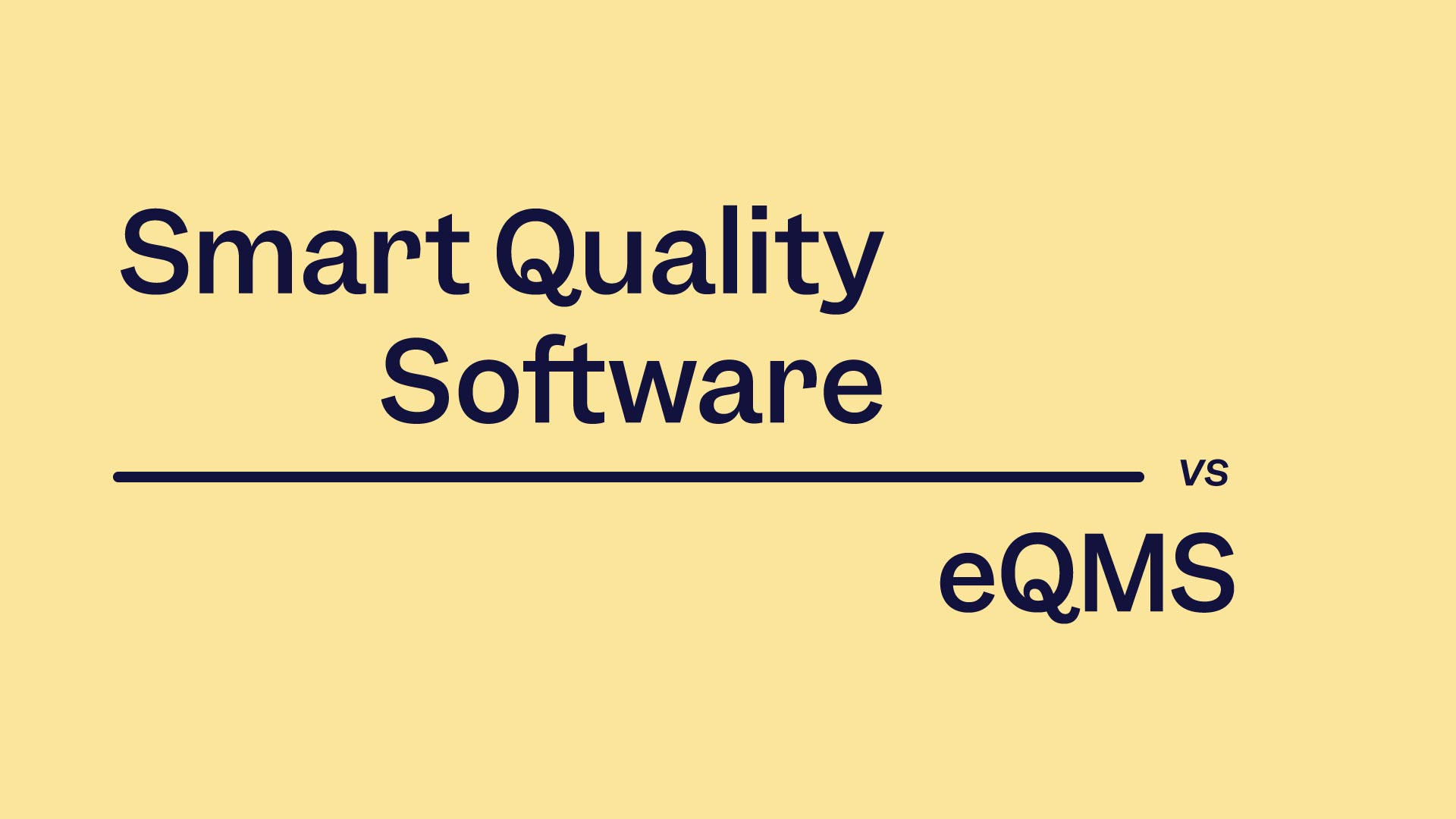How Smart Can Smart Software Be?
Smartphones, smart cars, smart cities, smartwatches, smart locks… and the latest addition to the list: Smart Quality Management Software! In today’s smart age, we are surrounded by many smart tools powered by cutting-edge technology, including some supported by artificial intelligence. The idea behind the smart tools is to think smart and work smarter. All these smart devices are now an integral part of our life, and pharmaceutical Quality management software is no exception. After all, the unprecedented technological capabilities in the Life Sciences are impressive and still growing, so the industry should undoubtedly leverage these booming technological advancements in Quality Management Software. So, let’s discuss what Smart Quality Management Software is all about. What is it capable of, and how is it changing the Quality landscape?
Why Smart Quality Management Software?
Balancing innovation with regulatory pressure is becoming an increasingly painstaking task. Delivering faster innovations with a growing regulatory burden slows down the speedy delivery of new research and development to healthcare providers and patients. Smart Quality Management Software efficiently removes this bottleneck by default. That’s why this software typically contains features that support the following:
Regulatory Compliance
Smart Quality Management Software works by creating sequential Quality actions to comply with regulations such as ISO 13485, ISO 9001, 21 CFR Part 11, and EU MDR. Since Smart Quality Management is compliant with mandatory regulations by default, organizations pass their audits by leveraging already integrated workflow structures with little to no effort. This completely transforms the organization’s perspective on Quality from a necessary cost of doing business to inherently compliant business workflows.
Flexible Workflows
A defining element of Smart Quality Management Software is that it catalyzes a mind shift. A Quality mindset usually requires a noticeable change in thinking and behavior. Organizations need a new perspective on what Quality can discover. Since every workflow in Smart Quality Management Software is digitally driven and linked to the other dependent workflows, it is very convenient to modify it digitally. This results in an employee mind shift, and your colleagues will start looking at Quality as an opportunity to discover new areas of improvement rather than the necessary mundane tasks to meet compliance requirements. If a workflow is modified, all dependent processes are instantaneously linked to the new workflow.
Quick Adaptability
In a Smart Quality Management System, the Quality assurance and Quality control workflows are digitally driven and embedded in the business processes. Additionally, everyone in the organization owns Quality, as every employee’s key Quality responsibilities are linked with the performance metrics. Therefore, Smart Quality Management is quickly adapted across organizations as Quality ownership is no longer limited to Quality assurance and Quality control functions.
Faster Innovation
Default regulatory compliance, flexible workflows, and quick adaptability drastically increase organizational efficiency, resulting in faster innovations as employees can finally focus on what they do best. In addition, increased participation from non-Quality employees in Quality activities also boosts company performance.
How Smart Quality Management Software Can Increase Employee Engagement
According to a recent McKinsey survey, out of 24 medical disposable product companies that involved non-Quality employees in Quality activities, 10% were high performers, 6% were average performers, and 5% were low performers. For more details, see the graphic below. In addition, the survey indicates that companies can achieve improved performance by involving non-Quality employees in Quality activities using a Smart Quality Management System.
Smart Quality Management Software Can Lower the Cost of Poor Quality
Smart Quality Management System also generates business value by saving on the cost of poor Quality. Generally, savings on the cost of poor Quality are made possible with the following:
- Reduced cost of inspection
- Reduced cost of audit failures
- Improved organizational efficiency by saving employees’ time on Quality actions
- Faster decision-making
- Increased transparency
Smart Quality Management as a Cornerstone for Quality Culture Throughout the Organization
Another McKinsey study shows that an organization’s Quality culture explains ~30% of batch acceptance variability in a manufacturing plant with only a 0.1% chance of coincidence.
Scilife’s Smart Quality Management Software Features
Smart Quality Management Software requires a technological upgrade in your electronic Quality system (often shortened to eQMS). But the implementation process can be overwhelming without the right software solution at hand. A specialized Smart Quality platform, such as Scilife, is an ideal solution for Life Science companies looking to make the move to Smart Quality. A Smart Quality platform fuses design thinking, gamification, and continuous learning with dynamic Quality management tools and insightful data. Let’s take a look at some of these exciting features:
1. Insightful Data
Data insights can come in handy when you’re looking to identify vulnerabilities in products and processes. Data can give a birds-eye view with real-time updates on process status and various key performance metrics for monitoring the organizational Quality to keep you on your toes and ready for whatever the future will throw at you.
2. Augmented Learning Methods
Augmented reality stimulates the mind more effectively than traditional learning methods. Therefore, Scilife offers a plethora of learning resources to inspire employees to upgrade their knowledge. Our learning resources include a multitude of quiz games, videos, articles, and many more augmented learning methods that are easy to digest and intuitive to navigate.
3. Rewards for Continuous Learning
No matter how easy it is to upgrade knowledge using augmented reality platforms, it is still worthless if users do not feel rewarded and acknowledged for taking the initiative to do the right thing first. Therefore, the Scilife Academy also provides Quality professionals the opportunity to earn an official Scilife Certification after they successfully complete a workshop. We have also introduced fun gamification features with new badges and competitive leaderboards to make professional education fun again.
The Future of Smart Quality Management Software
Smart Quality is not just jargon. It embodies a new technological advancement that is here to stay and evolve into an even more advanced form. In the near future, we can expect Smart Quality Management to do amazing things – such as executing algorithms to perform automated deviation investigations. This will not only save your Quality assurance resource time and energy but will also provide an unbiased assessment. The automated investigation will begin as soon as a new deviation is entered into the system. The algorithm will start scanning all possible data sources, such as ERP, MES, SCADA, PLCs, and Quality assurance tools, and then utilize natural language processing to identify and provide an assessment report for the root cause. As a result, the Quality assurance person will have plentiful information within a matter of seconds. It has been observed that identifying, describing, and eliminating the root causes of recurring deviations and nonconformances without any prejudice can reduce the overall volume of issues drastically.
Conclusion
Quality Management Systems are bringing a wave of change to the Life Sciences industry. Eventually, we can expect these smart systems to replace traditional pharmaceutical Quality management systems completely. These smart systems will also lead to unforeseen opportunities for organizations to grow and prosper. Gamification and augmented learning will make an entire organization eager to learn more about the latest Quality concepts. Everyone in the organization will do their bit for Quality rather than pushing this burden solely on the Quality assurance professionals. And – last but not least – Quality professionals will be spared from the annoying job of nagging to get pending actions completed from everyone. Jokes apart, Smart Quality Management Software is all about doing things differently and more effectively rather than doing too many different things ineffectively.
Do you want to experience firsthand how a Smart Quality Management Software works (QMS)?



